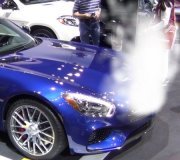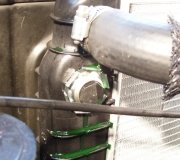Yup, a '93 has computers, just like my '95, but any junkyard computer will work, and there are companies that rebuild Lean Burn computers from the '70s, so computers will be available for a long time. Same with new engine parts. They are available for '40s and '50s cars, why not '80s and '90s. And junkyard parts are cheap.
As for not understanding new technology, I taught it for nine years in a community college. Electrical was my main specialty; my others were Suspension & Alignment, Brakes, and Engines. I was the alignment specialist at a Dodge dealership for ten years. My understanding of computers goes as far as replacement computers that must be programmed over the internet with software before they will work, and used computers that will not work because they must have the right VIN number programmed in. Can anyone explain how that helps the customer?
I agree engine computer controls are necessary for proper tail pipe emissions, (that's the only computer on my '88), but I don't think I'm so stupid that I need a computer to lock my car doors. Newer cars need computers to run wipers, head lights, dome lights, even heater and defroster controls. I have all those things on my van, they work fine, and none are run by computers.
To blow the horn on Fords, the horn switch sends a voltage to the instrument cluster, the most intelligent computer on the car, which sends a coded signal to the Front Electronic Module, (FEM), which turns on the horn relay. Smart! Two computers involved in honking the horn. How does that affect emissions? The most common fix for an inoperative horn costs over $500.00. Not on my car.
I agree there's other factors to consider when confronted with a major repair, but when you realize the typical repair bill on 2000 and newer cars is usually much higher than for the same repair on older cars, you have to wonder about the customer's needs. It's hard, in good conscience, to steer someone into a vehicle you know will present multiple expensive repairs in the future. I use my '88 van to pull an enclosed trailer that's bigger than the van. 210,600 miles on the original transmission, and not a single problem. My '95 is on its third computer-controlled transmission in 120,000 miles. It has never pulled a trailer. The dome lights in my '88 turn on with ten-dollar door switches, just like they did for the last 60 years. If I want the dome lights to work again in my '95, I'll have to replace the defective body computer. Better technology that I don't understand? There's nothing wrong with new technology, but there is a problem with over-complicating the issue unnecessarily.
Because manufacturers insist on using a computer to do what a simple switch can do more reliably and more cheaply, is the reason I will never buy another new car, and I will not own anything newer than a '95. I have swap spaces at the nation's second largest old car show, and I hear the same thing from a lot of people every year. People don't want the stuff being built today. As a former tv repairman, I still hear complaints about over-complicated remote controls. So we have the technology to have 50 buttons, but what good is it if people don't want it?
As far as rust, it makes me sick every winter to be living in Wisconsin where a pound of salt is thrown on top of an ounce of snow. After being driven daily in this crap, there is a lot less rust on my '88 than on my '95. Technology would be better used solving the rust problem, not on how to bleed more money out of unsuspecting customers. Build a car that's clean, reliable, and cheap to fix, and I'll buy it.
You made some valid points Service Writer, but it frustrates me every time I see the repair bills for newer cars. It's no wonder Detroit can't sell cars. Finally, if you look at this web site, you won't find wealthy people looking for advice on how to do their own repairs. It is populated by people like us who would rather save some money by doing for ourselves that which is possible to do safely and properly. You can see for yourself that the newer the vehicles are, the more likely the problem will be solved with an expensive computer. The older the vehicle is, the more likely the owner can do the diagnosis and repair with just a little advice. What is the stereotypical self-supporting college student or single mother going to be driving ten or twenty years from now, and how are they going to afford tuition, textbooks, rent, food, gas, diapers, utilities, ... And car repairs?
Caradiodoc
Saturday, April 11th, 2009 AT 6:17 AM



